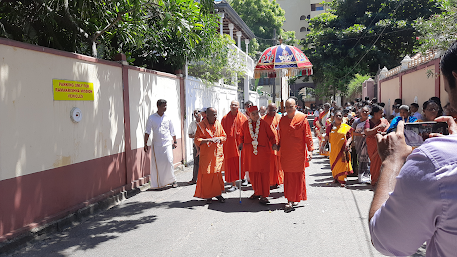 |
 |





திரு அருட்பா - வள்ளலார் விண்ணப்பம்
உத்தமர்தம் உறவு வேண்டும்
உள்ளொன்று வைத்துப் புறம்பொன்று பேசுவார்
உறவு கலவாமை வேண்டும்
பெருமைபெறும் நினது புகழ் பேசவேண்டும் பொய்மை
பேசா திருக்க வேண்டும்
பெருநெறி பிடித்தொழுக வேண்டும் மதமான பேய்
பிடியா திருக்க வேண்டும்
மருவு பெண்ணாசையை மறக்கவே வேண்டும் உனை
மறவா திருக்க வேண்டும்
மதி வேண்டும் நின்கருணை நிதி வேண்டும் நோயற்ற
வாழ்வுனான் வாழ வேண்டும்
தருமமிகு சென்னையிற் கந்தகோட்டத்துள் வளர்
தலமோங்கு கந்த வேளே
தண்முகத் துய்யமணி யுண்முகச் சைவமணி
சண்முகத் தெய்வ மணியே.
April 2, 1882 - Master's visit to Keshab (From Gospel of Sri Ramakrishna)
Sri Ramakrishna was sitting in the drawing-room of Keshab Chandra Sen's house in Calcutta;
it was five o'clock in the afternoon. ..................................................
Trailokya sang.
Suddenly the Master stood up and went into samādhi, repeating the Mother's name.
Coming down a little to the plane of sense consciousness, he danced and sang:
I drink no ordinary wine, but Wine of Everlasting Bliss,
As I repeat my Mother Kāli's name;
It so intoxicates my mind that people take me to be drunk!
First my guru gives molasses for the making of the Wine;
My longing is the ferment to transform it.
Knowledge, the maker of the Wine, prepares it for me then;
And when it is done, my mind imbibes it from the bottle of the mantra,
Taking the Mother's name to make it pure.
Drink of this Wine, says Ramprasad, and the four fruits of life are yours.
Sankara’s Bhaja Govindam – Verse 9
सत्सङ्गत्वे निस्सङ्गत्वं
निस्सङ्गत्वे निर्मोहत्वम् |
निर्मोहत्वे निश्चलतत्त्वं
निश्चलतत्त्वे जीवन्मुक्तिः ‖ 9 ‖
satsaṅgatve nissaṅgatvaṃ
nissaṅgatve nirmohatvam |
nirmohatve niśchalatattvaṃ
niśchalatattve jīvanmuktiḥ ‖ 9 ‖
Being in the company of good people (saints) gives rise to non-attachment; from non-attachment comes freedom from delusion, which leads to awareness of reality; understanding of reality gives rise to emancipation leading to the liberation of the soul (jīvan-mukti), while still alive.
satsaṅgatve — in good company, good association; nissaṅgatvaṁ — renounced, detachment; nirmohatvam — non-infatuated, non-delusion, clear-minded; niścalatattvaṁ — tranquillity, immutable reality, truth; jīvanmuktiḥ — liberated soul, emancipation while still alive.
– English Translation and Commentary by T.M.P. Mahadevan, 1962
* * * * * * * * * * * * * * * * *
Mantra-Diksha
divyam jnanam yato dadyat
kuryat papasya sankshayam |
tasmad dikseti sa prokta
desikais tattva-kovidaih ||
“The process that bestows divyam jnanam (transcendental spiritual knowledge) and destroys sin , is called ‘Diksha’ by the spiritual persons who have seen the Truth (desikais tattva-kovidaih).”
Mantra Deeksha | Shri Devi Mahathmyam (wordpress.com)
"Mother, I come to you so frequently, and I have received your grace, too. But then, why haven't I achieved anything? I feel that I am as I was before."
In reply the Mother said, "My son, suppose you are asleep on a cot and somebody removes you along with the cot to another place. Will you realize immediately on waking that you have been transferred to a new place? Not at all. Only when the drowsiness clears away completely will you realize that you have come to a new place."
- The Holy Mother, Sri Sarada Devi -




Visit to Thambyah Mudaliyar Chathiram






With Volunteers - Colombo












No comments:
Post a Comment